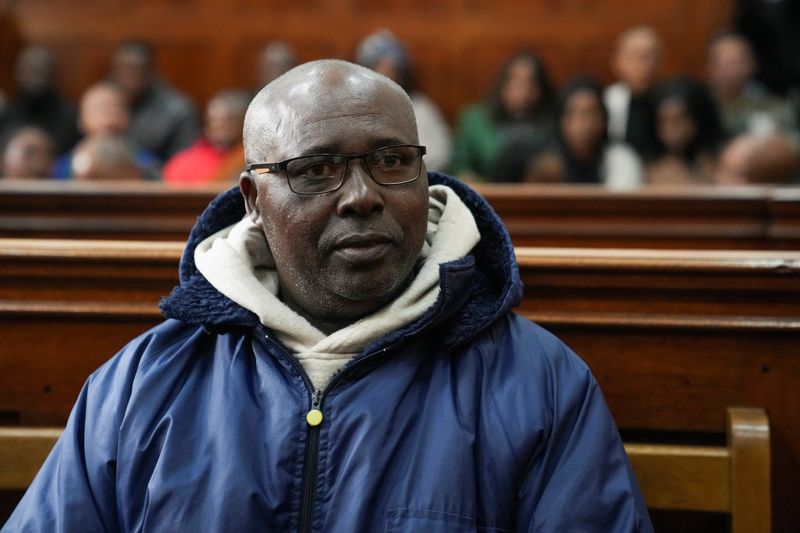Rwanda suspect denies killings but ‘sorry’ over genocide
2023.05.26 16:59
5/5

© Reuters. Rwandan genocide suspect Fulgence Kayishema appears in the Cape Town Magistrates court, in Cape Town, South Africa May 26, 2023. REUTERS/Nic Bothma
2/5
By Wendell Roelf
CAPE TOWN (Reuters) – One of the Rwanda genocide’s most wanted remaining suspects, accused of ordering the death of 2,000 people hiding in a church, denied on Friday any involvement though said he was “sorry” for the 1994 killings.
On the run for two decades, Fulgence Kayishema was arrested on Wednesday under a false name on a grape farm in South Africa where, according to a prosecutor, fellow refugees gave him up.
Entering court for a first hearing with a bible and book emblazoned with “Jesus first,” the 62-year-old was asked by a journalist if he had anything to say to victims.
“What I can say? We are sorry to hear what was happening,” he responded, coming up from holding cells at Cape Town Magistrates’ Court.
“It was a war at that time… I didn’t have any role.”
He was a fugitive from justice since 2001, when the International Criminal Tribunal for Rwanda (ICTR) indicted him for genocide over his alleged role in the destruction of the Nyange Catholic Church in Kibuye Prefecture.
An estimated 800,000 ethnic Tutsis and Hutu moderates were killed during Rwanda’s genocide, orchestrated by an extremist Hutu regime and meticulously executed by local officials and ordinary citizens in the rigidly hierarchical society.
At the Nyange church, Hutu militia lobbed grenades then doused it with fuel to set it ablaze. When that failed, they knocked down the church with bulldozers and most of those sheltering inside died.
REFUGEES
According to a charge sheet seen by Reuters, Kayishema faces five charges in South Africa, including two of fraud.
The fraud counts relate to applications he made for asylum and refugee status in South Africa, where the National Prosecuting Authority (NPA) alleges he gave his nationality as Burundian and used a false name.
Serge Brammertz, chief prosecutor of the International Residual Mechanism for Criminal Tribunals (IRMCT), the successor to the ICTR, told the BBC broadcaster that Kayishema fled Rwanda after the genocide and was hiding among refugees.
“First, he went to the DRC (Democratic Republic of Congo) for a number of months, then he went to a refugee camp in Tanzania. From there he moved to Mozambique. Then two years later to eSwatini and then in the late 90s he ended up in South Africa,” Brammertz said.
The prosecution persuaded a small number of former Rwandan soldiers with false identities living in South Africa as refugees to provide information on Kayishema’s whereabouts, he added.
Kayishema briefly appeared in court on Friday accompanied by masked police officers with automatic weapons and bullet-proof vests. The NPA said the case was postponed to June 2 to allow it time for further investigation.
“While he was being arrested, more information came, which could mean us adding more charges,” NPA provincial spokesperson Eric Ntabazalila told journalists.
Ntabazalila said prosecutors would oppose bail should he seek it.
Kayishema will be held at Cape Town’s Pollsmoor Prison ahead of extradition to Rwanda.








